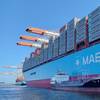INTERTANKO Welcomes IMO Bunker Decision
The International Maritime Organization (IMO) has agreed to consider introducing measures to improve controls of bunkers delivered to ships. After six submissions to the IMO over four years, to which INTERTANKO made a major contribution, persistence with another submission has resulted in progress to assure the quality of fuel delivered to ships.
A correspondence group will develop guidelines for states to ensure fuel quality compliance with MARPOL Annex VI. It will also consider the adequacy of the current legal framework for assuring the quality of fuel.
“We welcome this decision,” said INTERTANKO’s Managing Director Katharina Stanzel. “However this is only the beginning as we believe that control of compliance should be transparent along the entire supply chain. Our members and all ship owners should be able to have confidence, and documented proof, that fuels they receive are at or above the mandated standards.”
To control whether bunkers delivered and used by ships are compliant, most parties to MARPOL Annex VI control fuels used by ships (i.e. sampling fuel in the engine room). INTERTANKO has been arguing that there should be given first clear evidence of the quality of fuel supplied to the ship is compliant.
From January 1, 2015 tighter SOx emissions limits (<0.1%)will mean increased control on ships arriving in port. “Port authorities such as the EU Member States will have a real challenge in demonstrating non-compliance by testing fuels used by ships,” said INTERTANKO’s Technical Director Dragos Rauta, “when ships may hold test results demonstrating that the fuel delivered to them was not compliant.”
To protect their ships, INTERTANKO has advised its members to issue a Note of Protest to the Flag Administration, bunkering Port Authority and to Port State Control at the next port whenever bunker suppliers do not use IMO Guidelines to take the MARPOL sample and that sampling is not witnessed by the crew.
The latest submission, co-sponsored by INTERTANKO, Marshall Islands, Liberia and other industry representatives, found widespread recognition and support for amendments to the current rules to increase the control on fuels delivered to ships, arguing that there is ample evidence that the current regime is falling short.
However, arguments that regulatory changes aimed at improving control with bunker suppliers would be too burdensome for many countries and would fundamentally change the supplier/customer relationship led to a successful U.S. proposal to develop non-mandatory guidelines to ensure that bunker suppliers provide fuels that comply with the quality requirements in MARPOL Annex VI.












